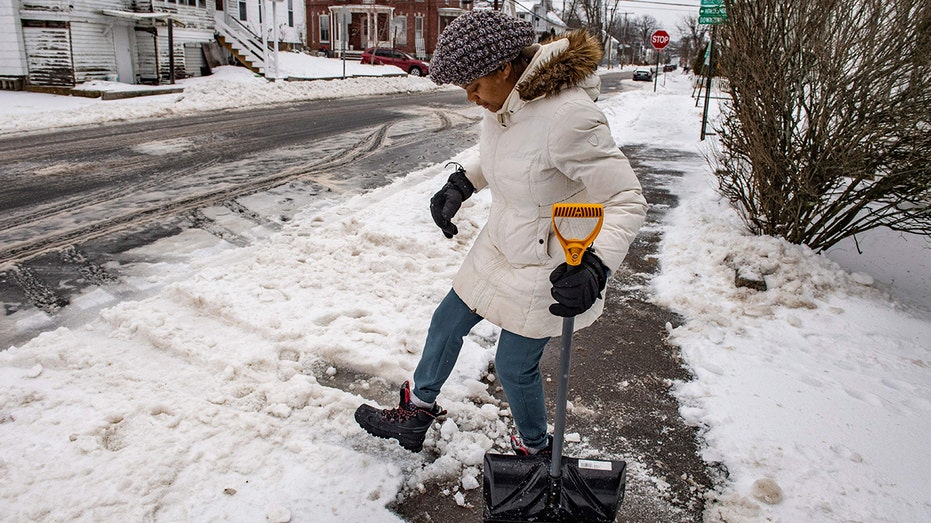Power the Future Executive Director Daniel Turner joined ‘Kennedy’ to discuss reports heating oil stockpiles in the Northeast and New England are down to a third of normal levels.
Home heating bills are soaring across the country amid already-elevated energy costs, and the Northeast is expected to be hit hardest this winter.
The region is particularly vulnerable due to ongoing diesel shortages and because it relies heavily on home heating oil. It also lacks the pipeline infrastructure of other areas of the U.S. and therefore must have liquid natural gas and other fuels imported.
But New England leaders, energy firms and experts say a 100-year-old law is contributing to problem, and are urging the Biden administration to lift it in order to ease the price pressures on consumers.

A woman kicks ice to break it up so she can clear it with a shovel during a winter storm in Concord, New Hampshire, on February 4, 2022. (JOSEPH PREZIOSO/AFP via Getty Images / Getty Images)
Months ago, New England governors suggested the Department of Energy consider suspending the Jones Act, also known as the Merchant Marine Act of 1920, which requires goods shipped between U.S. ports be carried on vessels built, owned and operated by Americans.
WHITE HOUSE DEFENDS EASING OIL SANCTIONS ON VENEZUELA, SAYS ‘PLENTY OF OPPORTUNITIES’ TO DRILL IN US
Due to the federal statute, the energy-poor Northeast buys its fuel from abroad because it is typically cheaper to do so than to buy from energy-rich domestic regions like the Gulf of Mexico. Since Russia’s invasion of Ukraine caused energy prices to surge in Europe, New England states are now competing even more with Europe for those limited supplies on the global market.
According to Scott Lincicome, director of general economics at the Cato Institute’s Herbert A. Stiefel Center for Trade Policy Studies, “That is causing major problems right now.”

A farming family on the edge of the White Mountain National Forest begins to prepare for the winter soon to come, on October 5, 2022, in rural Chatham, New Hampshire. (Andrew Lichtenstein/Corbis via Getty Images / Getty Images)
Lincicome told FOX Business that American-made ships cost roughly four to five times as much to build as their global counterparts, and there “are a grand total of zero” liquid natural gas tankers that are Jones-compliant because it is so cost-prohibitive to build such a sophisticated vessel domestically.
The federal government has issued Jones Act waivers in the past during emergencies. Former President Trump waived the Jones Act for Puerto Rico in 2017 to lift restrictions on ships providing aid to the island after it sustained massive damage from Hurricane Maria.
Department of Homeland Security Secretary Alejandro Mayorkas granted a waiver for a ship to deliver diesel to the island in September following Hurricane Fiona after the vessel floated offshore unable enter port due to the 100-year-old law.
ECO REGULATIONS FORCE MASSIVE COAL PLANT TO SHUT DOWN, SPARKING COMMUNITY UPROAR
Warnings have already been issued that the Northeastern U.S. could be staring down an emergency of its own.
The general manager of Groton Electric Light in Massachusetts sounded the alarm to customers earlier this month that the electric grid has been deteriorating for years and if New England experiences “an extended cold snap, there is a high probability of rolling blackouts” because “this year is even worse.”
He encouraged customers to fill up tanks of heating oil and propane soon, make sure back-up generators are working, and for anyone with wood-burning or pellet stoves to stock up on supplies.
Firewood supplier Robert Marble, left, splits a piece of ash wood with Roger Richmond, his assistant, November 19, 2022, in Charlotte, Vermont. With the rise in heating oil prices, more homes are heating with wood this winter. (Robert Nickelsberg/Getty Images / Getty Images)
“The governor’s up there and energy companies up there have all been clamoring for some sort of Jones Act waiver because inventories are low and there’s no respite on the horizon,” Lincicome said. “So everybody’s basically praying for a mild winter, which of course, is a terrible way to have an energy strategy.”
GET FOX BUSINESS ON THE GO BY CLICKING HERE
With concerns on the rise in the Northeast as the cold sets in for months and energy markets remain volatile, calls are growing for the Biden administration to consider waivers sooner rather than later. But President Biden is a strong proponent of the law and the labor union lobby that supports it, making the administration particularly hesitant to make an exception unless it is forced to do so.
“They’re probably not going to issue any sort of emergency waiver,” Lincicome says of the Biden administration. “Unless it’s just an absolute crisis situation, which at that point, it’s probably too late anyway.”
Read More: New England’s high heating costs exacerbated by federal government
